Men's Health Month: Five Foods to Add to Your Diet

Between 70 to 80 percent of sudden cardiac events occur in men, that’s according to the Centers for Disease Control and Prevention (CDC). The CDC also states that half of the men who die suddenly from coronary heart disease have no previous symptoms. Scott Shurmur, M.D., a cardiologist at the Texas Tech Physicians Center for Cardiovascular Health, said it is never too early to start looking at your heart health.
“If your doctor has started you on medications, there is a good reason why,” Shurmur said. “By all means take them. Even the best dietary and other health habits cannot replace medications in reducing cardiovascular events and improving your heart health.”
One way you can start getting or staying heart healthy is the foods you eat. Shurmur said these top 5 foods help get your heart healthy.
1. Fruits and vegetables
Not only are they full of antioxidants, vitamins and fiber, but they also can replace bad carbohydrates such as refined sugars and flours, white flour, white sugar white rice which are extremely sugary carbohydrates and should be minimized in the diet.
2. Legumes
These are round beans such as chickpeas, garbanzo beans, etc. Shurmur said legumes are an undervalued protein source that is very high in fiber and plant based protein.
3. Fish
Another excellent low-fat protein source that contains low-fat protein and heart healthy omega 3 fatty acids. Of course, Shurmur said frying fish defeats the purpose. Keep in mind that shell fish overall are an excellent source of food. Just remember that large predatory fish can have significant amounts of mercury, but should only be a concern if 6 or more servings a week are consumed.
4. Whey Protein
An excellent muscle-building source, Shurmur said whey protein is far superior to
soy. Nutritionally and metabolically, and particularly for men, soy has some weak
estrogenic affects. According to a study in the Journal of the American College of
Nutrition, when the effects of supplementing with whey versus soy were compared, research
showed that subjects using soy had lower testosterone responses. Also, the whey users
were better able to weaken cortisol (a stress hormone that breaks down muscle). Shurmur
said to
check the nutrition labels on your protein bars and other protein to see what they
contain.
5. Nuts
Most nuts have a heart-healthy mix of unsaturated fats with walnuts and almonds being the best. Shumur said to avoid peanuts if possible because they are not good nutritionally. If fat is added to them or if they are processed with fat or salt, then it defeats the purpose of trying to eat healthy. Best rule of thumb is to eat tree nuts, which are a good health source.
Related Stories
How Does Your Garden Grow?
As spring approaches, some people’s thoughts turn to gardening. Whether it’s a flower garden they desire or a vegetable garden want to have, they begin planning what they’ll plant and what they need to do to ensure a successful garden.
Adopt a Growth Mindset for a Better Life
A “growth mindset” accepts that our intelligence and talents can develop over time, and a person with that mindset understands that intelligence and talents can improve through effort and learning.
Drug Use, Family History Can Lead to Heart Disease in Younger Adults
Abstaining from drug abuse and an early diagnosis of familial hypercholesterolemia (high cholesterol) can help prevent heart disease.
Recent Stories
The TTUHSC Laura W. Bush Institute for Women’s Health Welcomes Ben Carson as Power of the Purse Keynote Speaker
Retired neurosurgeon and former U.S. Secretary of Housing and Urban Development Ben Carson, M.D., delivered a keynote address at the Power of the Purse luncheon and fundraiser today (April 18).
Filling the Gap: PA Impact on Rural Health Care
Assistant Professor and Director of Clinical Education Elesea Villegas, MPAS, PA-C, spoke about the challenges rural health care currently faces and how PAs are stepping up to better serve the rural patient population.
School of Pharmacy Remembers Contributions of Key Collaborator
Cynthia Nash, Pharm.D., served as an Adjunct Assistant Professor of Pharmacy Practice for the School, and was an instrumental collaborator and key ally in our partnership with the Dallas VA North Texas Health Care System.
